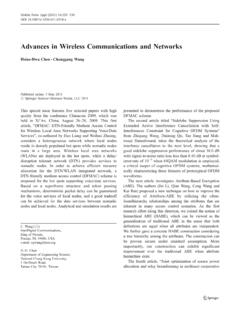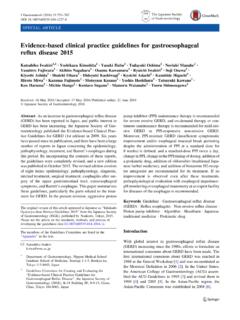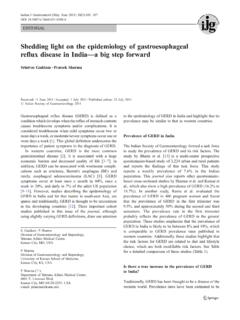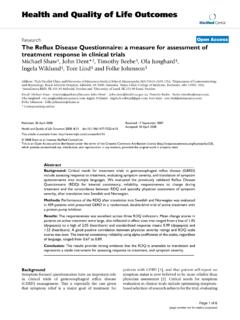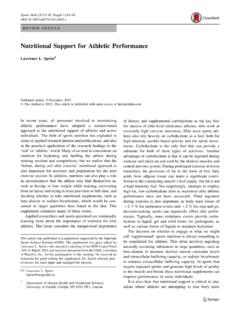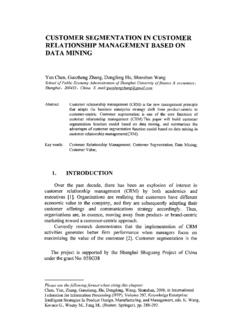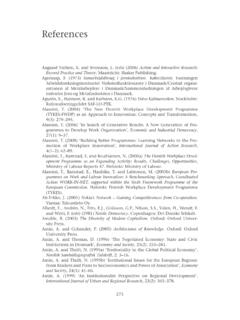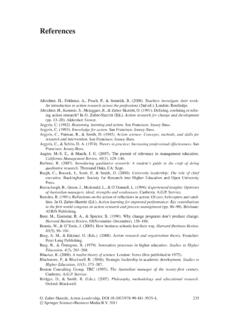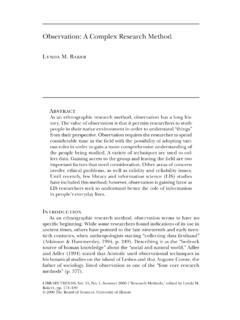Transcription of What is Qualitative in Qualitative Research - Springer
1 Qualitative Sociology (2019) 42:139 160. What is Qualitative in Qualitative Research Patrik Aspers 1,2 & Ugo Corte 3. Published online: 27 February 2019. # The Author(s) 2019. Abstract What is Qualitative Research ? If we look for a precise definition of Qualitative Research , and specifically for one that addresses its distinctive feature of being Bqualitative,^ the literature is meager. In this article we systematically search, identify and analyze a sample of 89 sources using or attempting to define the term Bqualitative.^ Then, drawing on ideas we find scattered across existing work, and based on Becker's classic study of marijuana consumption, we formulate and illustrate a definition that tries to capture its core elements. We define Qualitative Research as an iterative process in which improved understanding to the scientific community is achieved by making new significant distinctions resulting from getting closer to the phenomenon studied.
2 This formulation is developed as a tool to help improve Research designs while stressing that a Qualitative dimension is present in quantitative work as well. Additionally, it can facilitate teaching, communication between re- searchers, diminish the gap between Qualitative and quantitative researchers, help to address critiques of Qualitative methods, and be used as a standard of evaluation of Qualitative Research . Keywords Qualitative Research . Methods . Epistemology . Philosophy of science . Phenomenology If we assume that there is something called Qualitative Research , what exactly is this Qualitative feature? And how could we evaluate Qualitative Research as good or not? Is it fundamentally different from quantitative Research ? In practice, most active Qualitative researchers working with empirical material intuitively know what is involved in doing Qualitative Research , yet perhaps surprisingly, a clear definition addressing its key feature is still missing.
3 To address the question of what is Qualitative we turn to the accounts of Bqualitative Research ^ in textbooks and also in empirical work. In his classic, explorative, interview study * Patrik Aspers Ugo Corte 1. Department of Sociology, Uppsala University, Uppsala, Sweden 2. Seminar for Sociology, Universit t St. Gallen, St. Gallen, Switzerland 3. Department of Media and Social Sciences, University of Stavanger, Stavanger, Norway 140 Qualitative Sociology (2019) 42:139 160. of deviance Howard Becker (1963) asks How does one become a marijuana user?' In contrast to pre-dispositional and psychological-individualistic theories of deviant behavior, Becker's inherently social explanation contends that becoming a user of this substance is the result of a three-phase sequential learning process. First, potential users need to learn how to smoke it properly to produce the Bcorrect^ effects.
4 If not, they are likely to stop experimenting with it. Second, they need to discover the effects associated with it; in other words, to get Bhigh,^. individuals not only have to experience what the drug does, but also to become aware that those sensations are related to using it. Third, they require learning to savor the feelings related to its consumption to develop an acquired taste. Becker, who played music himself, gets close to the phenomenon by observing, taking part, and by talking to people consuming the drug: Bhalf of the fifty interviews were conducted with musicians, the other half covered a wide range of people, including laborers, machinists, and people in the professions^ (Becker 1963:56). Another central aspect derived through the common-to-all- Research interplay between induc- tion and deduction (Becker 2017), is that during the course of his Research Becker adds scientifically meaningful new distinctions in the form of three phases distinctions, or findings if you will, that strongly affect the course of his Research : its focus, the material that he collects, and which eventually impact his findings.
5 Each phase typically unfolds through social interaction, and often with input from experienced users in Ba sequence of social experiences during which the person acquires a conception of the meaning of the behavior, and perceptions and judgments of objects and situations, all of which make the activity possible and desirable^ (Becker 1963:235). In this study the increased understanding of smoking dope is a result of a combination of the meaning of the actors, and the conceptual distinctions that Becker introduces based on the views expressed by his respondents. Understanding is the result of Research and is due to an iterative process in which data, concepts and evidence are connected with one another (Becker 2017). Indeed, there are many definitions of Qualitative Research , but if we look for a definition that addresses its distinctive feature of being Bqualitative,^ the literature across the broad field of social science is meager.
6 The main reason behind this article lies in the paradox, which, to put it bluntly, is that researchers act as if they know what it is, but they cannot formulate a coherent definition. Sociologists and others will of course continue to conduct good studies that show the relevance and value of Qualitative Research addressing scientific and practical problems in society. However, our paper is grounded in the idea that providing a clear definition will help us improve the work that we do. Among researchers who practice Qualitative Research there is clearly much knowledge. We suggest that a definition makes this knowledge more explicit. If the first rationale for writing this paper refers to the Binternal^ aim of improving Qualitative Research , the second refers to the increased Bexternal^ pressure that especially many Qualitative researchers feel; pressure that comes both from society as well as from other scientific approaches.
7 There is a strong core in Qualitative Research , and leading researchers tend to agree on what it is and how it is done. Our critique is not directed at the practice of Qualitative Research , but we do claim that the type of systematic work we do has not yet been done, and that it is useful to improve the field and its status in relation to quantitative Research . The literature on the Binternal^ aim of improving, or at least clarifying Qualitative Research is large, and we do not claim to be the first to notice the vagueness of the term Bqualitative^ (Strauss and Corbin 1998). Also, others have noted that there is no single definition of it (Long and Godfrey 2004:182), that there are many different views on Qualitative Research (Denzin and Lincoln 2003:11; Jovanovi 2011:3), and that more generally, we need to define its meaning (Best 2004:54). Strauss and Corbin (1998), for example, as well as Nelson et al.
8 (1992:2 cited in Denzin and Lincoln 2003:11), and Flick (2007:ix x), have recognized that the term is problematic: BActually, the term Qualitative Research ' is confusing because it can mean different things to Qualitative Sociology (2019) 42:139 160 141. different people^ (Strauss and Corbin 1998:10 11). Hammersley has discussed the possibility of addressing the problem, but states that Bthe task of providing an account of the distinctive features of Qualitative Research is far from straightforward^ (2013:2). This confusion, as he has recently further argued (Hammersley 2018), is also salient in relation to ethnography where different philosophical and methodological approaches lead to a lack of agreement about what it means. Others ( Hammersley 2018; Fine and Hancock 2017) have also identified the treat to Qualitative Research that comes from external forces, seen from the point of view of Bqualitative Research .
9 ^ This threat can be further divided into that which comes from inside academia, such as the critique voiced by Bquantitative Research ^ and outside of academia, including, for example, New Public Management. Hammersley (2018), zooming in on one type of qualita- tive Research , ethnography, has argued that it is under treat. Similarly to Fine (2003), and before him Gans (1999), he writes that ethnography' has acquired a range of meanings, and comes in many different versions, these often reflecting sharply divergent epistemological orientations. And already more than twenty years ago while reviewing Denzin and Lincoln' s handbook of Qualitative Methods Fine argued: While this increasing centrality [of Qualitative Research ] might lead one to believe that consensual standards have developed, this belief would be misleading. As the method- ology becomes more widely accepted, querulous challengers have raised fundamental questions that collectively have undercut the traditional models of how Qualitative Research is to be fashioned and presented (1995:417).
10 According to Hammersley, there are today Bserious treats to the practice of ethnographic work, on almost any definition^ (2018:1). He lists five external treats: (1) that social Research must be accountable and able to show its impact on society; (2) the current emphasis on Bbig data^ and the emphasis on quantitative data and evidence; (3) the labor market pressure in academia that leaves less time for fieldwork (see also Fine and Hancock 2017); (4) problems of access to fields; and (5). the increased ethical scrutiny of projects, to which ethnography is particularly exposed. Hammersley discusses some more or less insufficient existing definitions of ethnography. The current situation, as Hammersley and others note and in relation not only to ethnog- raphy but also Qualitative Research in general, and as our empirical study shows is not just unsatisfactory, it may even be harmful for the entire field of Qualitative Research , and does not help social science at large.
